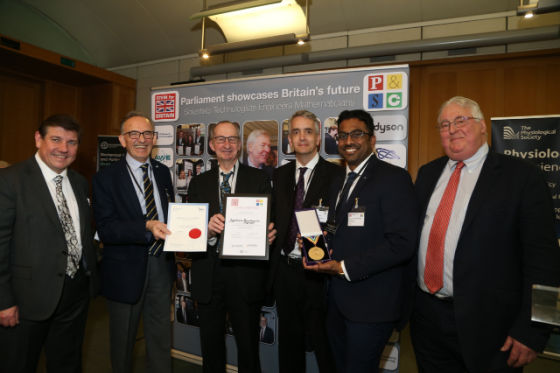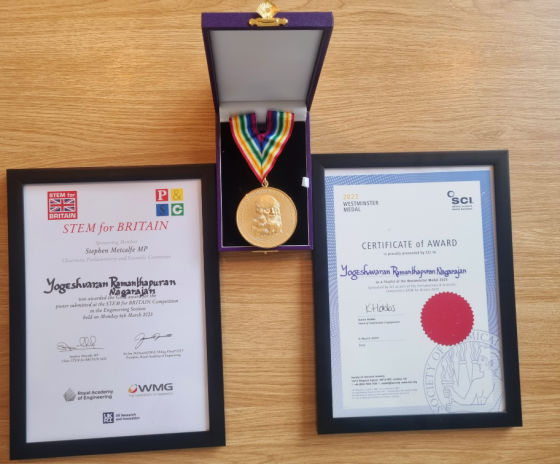Turning recycled plastic into prosthetic aids to help amputees in low and middle-income countries to walk again, has won a national award for a De Montfort University Leicester (DMU) researcher.

Yogesh, second from right, with academics and industry members after receiving his Gold Medal at the STEM for BRITAIN 23 presentation
PhD student in Mechanical Engineering, Yogeshvaran (Yogesh) Nagarajan, has won the first-ever poster competition Gold Medal for DMU in STEM for BRITAIN 23, a contest run by the House of Commons. He also scooped a £1,500 prize, beating 29 other universities across the UK by coming top in the engineering category.
Yogesh has helped to provide low-cost, eco-friendly prosthetic limbs, working with Dr Karthikeyan Kandan, Associate Professor in Mechanical Engineering at DMU, who pioneered the world-leading invention to upcycle plastic bottles and turn them into prosthetic sockets.
DMU is currently the only centre for the production of these novel prosthetic sockets which cost just £10-£12 for each patient. The sockets have so far helped 53 people in Jaipur, India to be able to walk.
“I am delighted to have won this award,” said 29-year-old Yogesh, who lives in Leicester. “It is a wonderful recognition by the House of Commons of our valuable research work at DMU. I am proud to have competed with so many universities and to have our research acknowledged as world-class.
“Our aim has been to tackle two major issues, global amputees and plastic pollution. This innovative design and development of prosthetic sockets using recycled materials is 500 per cent cheaper than other techniques and meets the needs of more than 30 million amputees around the world, while also reducing plastic waste pollution.”

Yogesh’s STEM for BRITAIN 23 Gold Medal
Yogesh, who is originally from southern India, explained that to produce the patient-specific sockets they use an infrared based composite curing oven, located at DMU.
He said: “The socket forms a link between the amputee’s limb and prosthetic components. We use about six or seven shredded two-litre plastic bottles to turn them into one prosthetic socket for each patient. These are custom-made for the shape of the residual limbs and it is vital to have a good fit.
“Our recycled prosthetic sockets are comfortable, durable and low cost, as well as being lightweight, ecological and made from material that is easily available and fully recyclable. So far, feedback from people using them has been excellent.”
Yogesh added that globally at present, 80 per cent of amputees do not have access to prosthetic and orthotic devices. “Diabetes mellitus is the leading cause of amputation, with an estimated risk to 500 million people by 2035. Poverty and disability are the main challenges in the low-income countries,” he said.
Dr Kandan first incubated research on recycled plastic prosthetics in 2017 and was awarded two research grants from the Academy of Medical Sciences and Royal Academy of Engineering to develop this. In these collaborative research grants, Dr Kandan worked with the Bhagwan Mahaveer Viklang Sahavata Samiti in Jaipur, India, as well as prosthetic experts from the Malaviya National Institute of Technology, Jaipur, India and the University of Strathclyde.
Dr Kandan said: “Yogesh, supervised by myself and co-supervised by senior lecturer in Mechanical Engineering Dr Farukh Farukh, has been working on this project for three years. He has achieved great results over the course of the project and it is a remarkable achievement to have won this Gold Medal for our university.”
During the recent presentation for his award, Yogesh gave a talk about his research to dozens of politicians and a panel of expert judges, comprising academics and industry members.
Yogesh came to DMU five years ago and gained a Master’s in Mechanical Engineering with Distinction in 2018. He hopes to continue research work, once he completes his PhD this summer.
STEM for BRITAIN is a poster competition in the House of Commons - involving approximately 120 early stage or early career researchers - judged by professional and academic experts. It aims to help politicians understand more about the UK’s thriving science and engineering base and rewards some of the strongest research being undertaken.
Posted on Thursday 30 March 2023